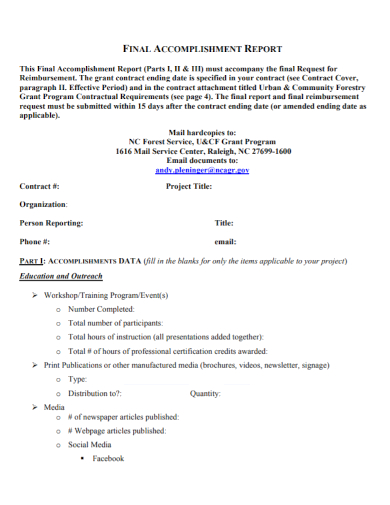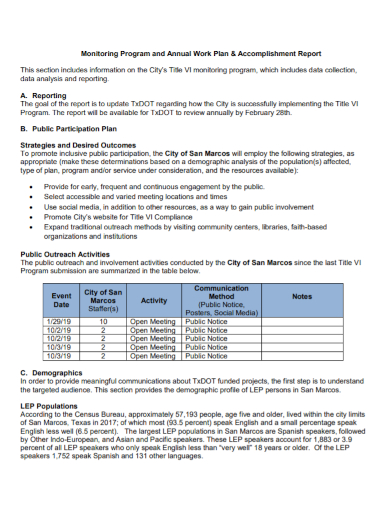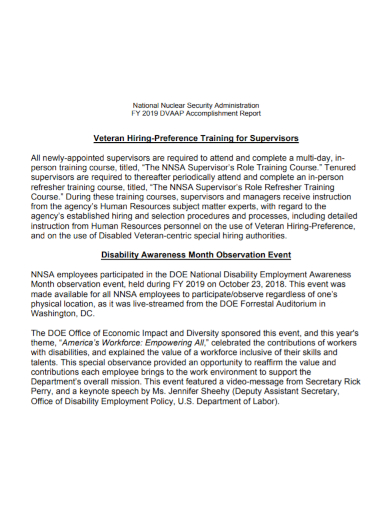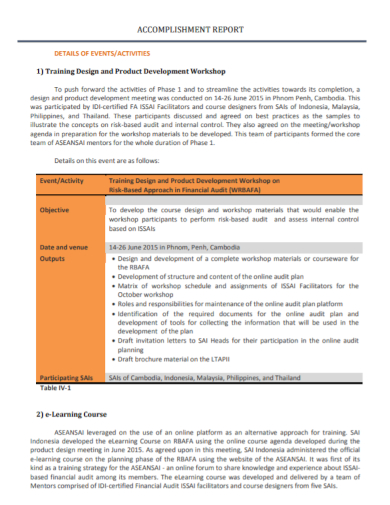Every event manager is tasked to create an event accomplishment report or post-event report, to take note of high points, and provide information about the improvements to do in the future. Event managers use this report to present all the occurrences that happened during the event. This is also a great way to honor the hard work of everyone who was involved in the event to make it successful and convince the clients to make the event happen again. To help you create your own event accomplishment report, read the article to find out how!
3+ Event Accomplishment Report Samples
1. Final Event Accomplishment Report
2. Annual Event Accomplishment Report
3. Administration Event Accomplishment Report
4. Event Activity Accomplishment Report
What is an Event Accomplishment Report?
An event accomplishment report is a formal status report that gives an overview of what was achieved during a certain event. All details that happened and the background of the event are included in the report.
How to Write an Event Accomplishment Report
1. Identify the Event
Write the introductory paragraph that describes the event. Make an outline that summarizes the details of the event. Include also the statement of purpose since it provides the reason why the event was conducted and the goals it implemented and if the goals were achieved. The contents of this section must be summarized since it will be elaborated further in the next sections.
2. Provide Data
This section must provide a detailed description of the happenings during the event. This section must have the data of the following aspects:
- Event program and speakers/performers: Include information about the speakers pr the performers and the event program.
- Location and venue: Describe the venue details (the building, event room, the AV equipment, maintenance, and catering) and its location.
- Marketing and sponsorship: Provide a summary of the marketing, media, and promotional activities that you did for the event. Include also a summary of sponsorship packages and sponsorship revenue.
- Staff: Describe the duties of every staff member present at the event. This includes the staff of your event management agency, catering staff, maintenance staff, and design staff.
3. Emphasize Highlights and Acknowledge Challenges
This section must outline the areas that worked successfully and the areas that need some improvement. All the happenings in the events should be assessed objectively in this section. Review every aspect of the event; you can use your attendee’s surveys as your guide in your assessment.
Make a subsection where you highlight all the happenings that successfully hit your goals. Categorize the highlights based on different aspects of the event stated above. Make another sub-section where you mention the areas that didn’t quite hit the goal. When presenting this sub-section, spin the information on a positive note; you can give your insights on how you will improve these areas and apply them to the next event.
4. Present the Financial Aspects
This section must present the income and expenses of the event factually. Describe all the financial information of the event including the projected estimated costs and income, the actual cost and income, and the unexpected that weren’t included in the original estimate.
Provide a concise explanation on how you spend your finances, and how you dealt with unexpected expenses, and if the income is obtained the way you projected it. Use your budget planner as your reference to guide you on presenting your entire budget from pre-planning to post-event. From your findings, provide recommendations for future events. This will guide you in preparing budgets for the next event.
FAQs
What are the five Cs of event management?
The five Cs of event management are concept, coordination, control, culmination, closeout.
What are the different classifications of an event?
Below is a list of the different classifications of an event and its examples:
- Corporate events: seminars, conferences, trade shows, workshops
- Social events: reunions, themed parties, street parties, exercise classes
- Fundraising events: auctions, sponsored events, sporting events, gala dinners, community sales (bake drive, yard sale)
- Festivals: music festivals, food festivals
How do event managers get clients?
Event managers get clients through promoting themselves online and offline, demonstrating their expertise, partnering with organizations, and asking influencers to promote their work.
The event accomplishment report is a great document to help you reflect on the missteps and missed opportunities of the event. When presenting your report, be honest and direct about your achievements and your suggestions to address the weak parts of the event. Let the report be your reference for your next event’s success. If you’re now ready to create your own event accomplishment report, download the free sample templates provided above to help you get started!
Related Posts
FREE 16+ Sample Weekly Status Report
FREE 15+ Sample Progress Report
FREE 13+ Event Analysis Samples
FREE 12+ Sample Performance Reports
FREE 11+ Sample Project Completion Reports
FREE 11+ Consultant Status Report Samples
How to Create a Daily Construction Report?
FREE 10+ Weekly Research Report Samples
FREE 9+ Building Inspection Report Samples
FREE 8+ Neuropsychological Evaluation Report Samples
FREE 36+ Report Templates
FREE 20+ Board Report Samples
FREE 14+ Sample Events
FREE 14+ Sample Project Status Reports
FREE 10+ Report Worksheet Samples




